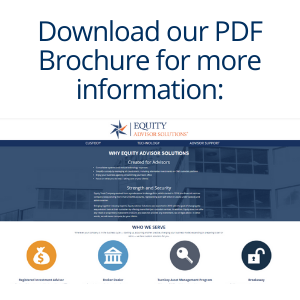Without a succession plan, a small advisor firm could lose virtually all its market value in a single instant—leaving family and heirs with nothing. The good news: succession planning doesn’t have to feel overwhelming. In our previous post, we broke down succession planning tasks into smaller chunks you can complete quickly. Here are two more hacks to keep you moving forward.
30-Minute Hack: Interview a potential successor or buyer.
Whether you’re considering an internal successor, a merger, or a buyout deal, at some point you need to initiate a frank discussion with your potential transaction partner. These questions can help guide you through a productive half-hour conversation:
- Why are you interested in my business?
This question can help you distinguish casual tire-kickers from genuinely interested parties who already understand your firm’s potential. Are you both genuinely committed to finding a good match, or are you talking to someone who is just doing research? It can also show you an outsider’s point of view on what makes your firm valuable, which may offer a different perspective from yours.
- Are we here for the same reasons?
Make sure your goals for the conversation are aligned. You may be looking for someone to take over your firm as a going concern, and perhaps to invest in its future growth. Is that what your potential successor wants? Or are they looking to acquire client relationships, eliminate a competitor, extract bits and pieces, or simply bring you on board?
- What do you bring to the table?
Is your suitor offering cash, equity, or other types of participation? If your potential successor is an advisor, you’ll want to know about prior experience owning or running a business (which is not to suggest you should automatically exclude new entrepreneurs). If you are doing business with a larger organization, ask about its track record with firms like yours and make a note to interview other sellers.
- What is your long-term plan for the business?
No serious buyer approaches a seller without first having at least preliminary ideas about long-term options. Make sure your successor’s vision for the business, its employees and its clients aligns with yours. A family member or internal successor may need more time to develop a strategic plan, but it’s still a subject that should be broached right from the start.
- What will you keep, change, or get rid of?
A buyer may not be able to answer this question fully at the start of the process. However, cutting through generic PR language and getting straight to the details can help build mutual trust.
- What are the greatest challenges facing my business, and how would you solve them? By hearing how potential successors would tackle the issues you face, you can better judge how perceptive and competent they are.
- [If the successor is a family member:] How will we keep our personal and professional lives separate? If your successor is a child or other family member, you can avoid much pain and conflict by agreeing to abide by a set of guidelines to keep you from looking over the buyer’s shoulder, and to keep your buyer from constantly pestering you for advice.
One-Day Hack: Host a One-Day Succession Planning Event.
Once you’ve identified key players, it’s time to win their buy-in. Your employees should know what roles they are expected to play in a transition, what expertise is required to do the job, and how they will fill any gaps in their skills.
These conversations often stretch out for months. Instead, try completing them at a one-day crash-course event. After just one day, you can aim to—
- Gain clarity from all employees about their specific interests and capabilities
- Obtain buy-in from employees to embrace their future roles and learn the skills needed
- Present a detailed training schedule tailored to each team member
Sample agenda.
You can break up the day into modules following a simple agenda, such as:
- New Career Opportunities: Discuss how employees’ career goals and interests intersect with the future needs of the firm
- Future-Proofing Your Skills: Identify key skills and competencies for development
- Action Plan for Development: Agree on personal plans for learning, training, development, and knowledge transfer
This format is easy to adapt to your firm. You can break the event into two half-day sessions to give employees more time to articulate their career goals. Or you can complete the entire agenda in half a day at a smaller firm. Regardless of your approach, employees should walk out of the session with a clear understanding of their future roles and detailed personal roadmaps to guide their development.
Custody and Administration Services provided by Equity Trust Company. Equity Advisor Solutions is an affiliate of Equity Trust Company.


